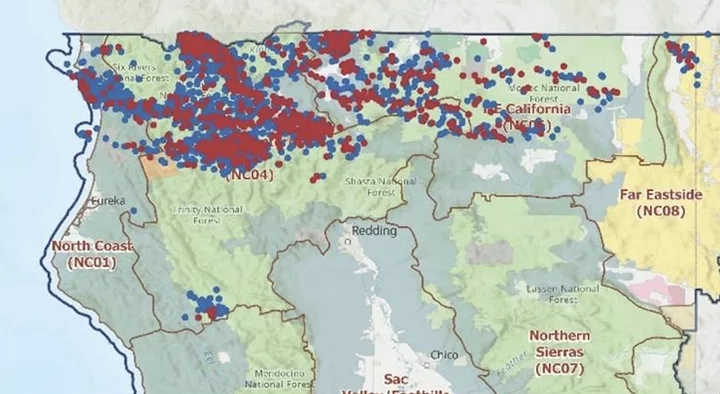Map showing the location of recent lightning strikes across Northern California. The red dots represent positive lightning, the blue dots are negative | Six Rivers National Forest
Six Rivers National Forest release:
Yesterday, the Six Rivers National Forest received lightning from thunderstorms that passed over Northern California.
As of 7:30 a.m. PDT this morning, there were approximately 282 lightning strikes over the North Coast. Firefighters are responding to lightning fires as they are discovered by both ground and aerial resources. At this time, there are five confirmed lightning fires on two Ranger districts.
Gasquet Ranger District
Myrtle Fire – Approximately .1 acre with ground resources on scene. The fire is located northeast of Crescent City on Low Divide Road near Forest Route 17N21 near the top of the ridge. Fire is controlled and in patrol status.
Goose Fire – Approximately .25 acre located northeast of Klamath near Red Mountain Road (forest road 15N13). Forest Service resources include three engines, one handcrew, one watertender, an air attack and two helicopters responding. CAL FIRE Humboldt-Del Norte Unit is providing two additional handcrews and two dozers to clear paths for access to the fire.
Goose Two Fire – Approximately .1 acre located east of Rocky Saddle. Currently one Forest Service engine onsite, and fire was detected using interagency aircraft. Fire is contained and firefighters are working on mop up and control.
Broken Fire – Currently the size is unknown, located northeast of Klamath near the east fork of Goose Creek. Forest Service resources include three engines, two handcrews, and one watertender responding. CAL FIRE Humboldt-Del Norte Unit is also assisting with two handcrews and 2 dozers to clear paths for access to the fire.
Orleans/Ukonom Ranger DistrictOrleans/Ukonom Ranger District
Wooley Fire – Currently unknown size, this fire reported in the Marble Mountain wilderness near the Black Mountain Trailhead. Aircraft patrolled the area and were unable to locate, however, aircraft will continue to patrol. A Red Flag Warning remains in effect until 11 p.m. tonight and more lightning is in the forecast today over the Six Rivers National Forest.
# # #
Holdover lightning fires can smolder for days and even weeks following a thunderstorm. It can take several days of dry and warm weather for these fires to become visible.
Firefighters will continue to monitor conditions and respond to lightning fires as they are discovered in the coming days.
“The Six Rivers National Forest has steep, challenging terrain where access can be a challenge, especially with lightning fires burning in remote areas,” said Six Rivers National Forest Fire Management Officer Josh Eichamer. “We are committed to swift suppression with public and firefighter safety our top priority.”
Firefighters will make appropriate risk-informed efforts to fully suppress small fires before they become large, complex incidents to ensure protection of lives, property, valuable timber and natural resources. This means suppressing fires as swiftly as possible to minimize fireline exposure and readiness for the next ignition.
“This is the annual week of remembrance honoring fallen wildland firefighters,” Eichamer said. “It is a somber reminder of the risk wildland firefighters face and as we respond to lightning fires our ultimate goal is for every firefighter to make it home safely to their family and friends at the end of the incident.”
To help firefighters focus on lightning fire response, area residents and visitors are asked to be careful with anything that can spark a wildfire and to help prevent additional fires. The public can also report suspected wildfires by calling 911.
As a reminder, all fireworks are prohibited on National Forest System lands, including the Six Rivers National Forest and developed recreation sites. This includes poppers, sparklers and other fireworks.
The Forest is not currently under fire restrictions, but preventing human-caused wildfires is important, especially as firefighters are responding to lightning fires. Campfires should never be left unattended and should be dead out and cold to the touch before leaving.

CLICK TO MANAGE